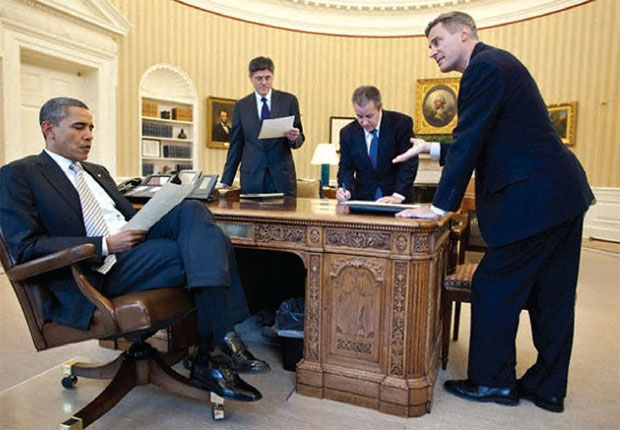
CAM: Something like the “grand bargain” that fell apart last summer?
AK: The president has repeatedly made it clear that he wants a balanced approach. I think he recognizes the importance of addressing the imbalance between our spending and our revenues while we have the window to make these adjustments.
CAM: How long before that window slams shut?
AK: You know, it’s really hard to put a precise time on it. I would say it’s sufficiently long for Congress to act in a deliberate fashion. And I also think it’s important for people to recognize that this is another one of those problems that didn’t start overnight. In the previous administration, taxes were cut without revenues to pay for them, without spending cuts to offset those tax cuts. Prescription drugs were added to Medicare without the revenue to pay for them, and two wars were prosecuted without funding. And those forces are the main reasons why the deficit is as large as it is today, combined with the fact that the recession that began at the end of 2007 was very deep and cut into revenues.
CAM: You gave a notable speech in January about income inequality and how it might be hurting economic growth.
AK: I have increasingly begun to believe that the rise in inequality is actually affecting our prospects for growth. For example, we’ve shifted more and more income to the highest income-earners, who have a much lower propensity to spend that money, and that has reduced aggregate demand. On top of that, I fear that the rise in income inequality is going to reduce social mobility. If you think about all of the benefits that a family with a high income can buy for their children—a neighborhood with a better school, private tutors, help studying for the SAT exam, help writing college essays, advice about which colleges to apply to, networks in the job market, and so on—the rewards for all of those things have increased. That’s going to make it harder for children born to lower-income families to move up the income ladder.
CAM: Was the Occupy Wall Street movement a fleeting thing, or will the protestors have some lasting impact?
AK: That’s hard for me to say. I think that the frustrations that motivated them are frustrations that I share, that a number of policymakers share. And I think it’s important that we build an economy that addresses the problems that motivated that group. I think that the president’s commitment to changing the tax code so it’s more fair is an important step in that direction.
CAM: Earlier in your career, you did some work on what you call “rockonomics”—the economics of rock-and-roll. What was your most interesting finding?
AK: Concert tickets have soared in price, faster than health-care inflation, faster than college tuition. The best theory I have is that the performers used to make money from selling albums—you know, those round discs that you and I would buy when we were at Cornell—and then the technology changed. Bands make much less of their income from selling recordings, so now they turn to concerts as a profit center. Before, concerts were something of a loss leader to sell more albums. And they could have charged a higher price back then if they had wanted to, but they kept the price low because they wanted to be more popular and sell more albums. Now they rely on concerts much more as a source of income, and they’re charging the kind of monopoly price that the market will bear.
CAM: When did you decide you wanted to be an economist?
AK: Around my sophomore year at Cornell. When I started college, I was interested in going to law school. ILR required taking micro and macro from the economics department for freshmen. And I really liked those courses; I did well in them. I’ve always felt a little bit screwed up because I took macroeconomics before microeconomics, which I don’t think is the appropriate way to teach economics, even though we do it that way at Princeton. So there are different views about that. Then I had a lot of labor economics while I was at Cornell, and I particularly enjoyed a course I had on social insurance from Robert Hutchens, who is still teaching.
CAM: You stopped paying your class dues in 2009. Was it the recession? And if you start paying your dues again, is that a leading economic indicator?
AK: Actually, my wife is also a Cornellian, so I’m going to finger her for not paying dues. I could also point out that in 2009 I took a pretty big pay cut! But we’ve been generous to Cornell over the years, and both of us are really proud to be Cornellians. I think a lot of my understanding of economics, a lot of my values, were developed while I was at Cornell. ![]()
Bill Sternberg ’78 majored in American studies and was an editor of the Daily Sun. He is currently deputy editorial page editor at USA Today. In the March/April 2011 issue, he interviewed educators Michelle Rhee ’92 and Randi Weingarten ’80.


